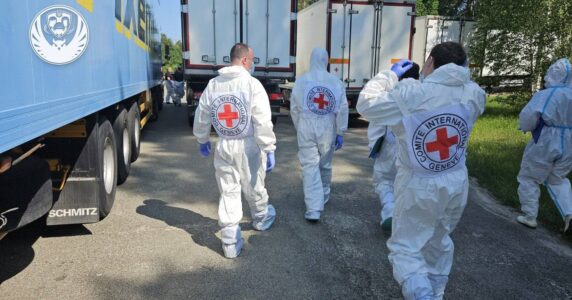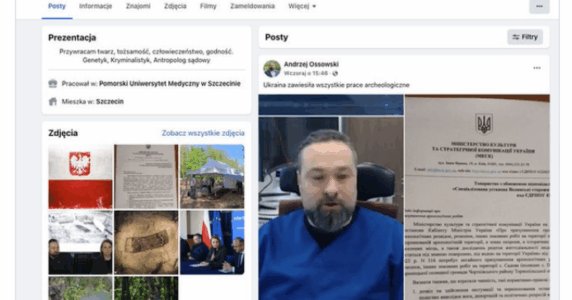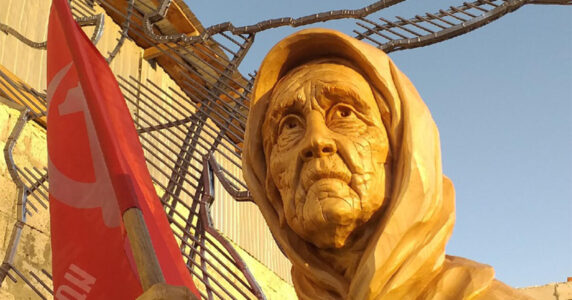Navigation and useful materials
On May 22, the NATO Parliamentary Assembly, in a Declaration on an Unwavering Support for Ukraine, called the political regime of the modern Russia “ruscism.” Thus, this term was included in the official international document for the first time. And this can be considered the first response to the Statement of the Verkhovna Rada of Ukraine “On Recognizing the Political Regime Existing in the Russian Federation as Ruscism and Condemning Its Ideological Foundations and Social Practices as Totalitarian and Misanthropic,” approved by the Resolution of May 2.
How Ukraine Discovered Ruscism
Russians who are actively involved in or support the aggression against Ukraine began to be called “ruscists.” The full-scale invasion broadened the scope of the notion to include media, commentary by politicians, and commentators. After the discovery of the crimes of Bucha and Mariupol, its meaning went far beyond trolling of Russian propaganda, which mechanically repeats that Ukrainians are fascists and Nazis.
In 2022, Russia attempted to exterminate an entire nation by planning an ethnocide through murder, repression, and re-education of millions of Ukrainians to forcibly turn them into Russians. This savage attempt to erase the nation takes place in a technological era when it is no longer possible to destroy or hide information. The victims of the Kremlin’s violence were the people who bore the horrors of World War II and was the formal founder of the current international system, the United Nations.
The West often realizes that Putin is an absolute evil, a totalitarian leader-chauvinist with colonial imperial goals. But the description of modern Russia in terms of “fascism”/ “ruscism” is still unusual and controversial there. However, apart from Putin, there is a bigger idea in Russia that pushes the Russian people to commit a crime. This driving force must be learned to recognize and label.
The concept of “ruscism,” although coming from grassroot genres of social communication, describes the essence extremely well, and therefore can be used for conceptual understanding.
The resolution of the Parliament defines ruscism as an ideology and practice, the formation of which was influenced by:
1. Russian chauvinism and imperialism;
2. Soviet totalitarian regime;
3. German National Socialism (Nazism).
This can be interpreted as Russian radical revanchism seeking revenge for its sense of humiliation at the collapse of the Soviet Union. Moreover, ruscism is not only a hateful worldview, but also the approval of terror, murder, torture, and a fundamental denial of reality, which legitimizes shameless lies in its own interests.
Historian Timothy Snyder dwelled on such a basic sign of ruscism as a lie. “Fascists calling other people ‘fascists‘is fascism taken to its illogical extreme as a cult of unreason. It is a final point where hate speech inverts reality and propaganda is pure insistence…I have called it ‘schizofascism.’ The Ukrainians have the most elegant formulation. They call it “ruscism,” Timothy Snyder wrote in a column for the New York Times titled “We Should Say It. Russia Is Fascist.”
As for terror, it can be recalled that the USSR was created by fanatical revolutionaries who professed the cult of violence in the fight against ideological opponents and as a means of radical restructuring of the social system. During the 20th century, Moscow supported terrorist movements around the world as an instrument of geopolitical confrontation with the West. There is a lack of awareness in public opinion in the world that the vast majority of ideologists and propagandists of modern Russia are open Stalinists, carriers of the ideas and practices of the Bolsheviks, in particular because of their direct genetic connection with the Soviet special services.
Undisguised calls for terrorism against civilians in European capitals are openly heard on Russian state TV. Igor Shishkin, a long-time “expert” in the service of the regime, states: “If France delivers weapons that kill Russian people, blood should be flowing on the streets of France. If Germany sends tanks that kill Russian soldiers, blood should be flowing on the streets of Germany. Right now, the’re fighting against us through proxies. There are many of those who want to fight against them. We should also be striking them through proxies….realize that it’s dangerous for them. Doesn’t England have enemies? Why couldn’t some fighter against colonialism use a Javelin in London right now? And in France … aren’t there fighters who want to turn the Notre Dame Cathedral into a mosque? Yes! They should get Javelins and Stingers…”And this is just one of thousands of such examples of Russia’s terrorist rhetoric.
By defining what ruscism is, we see common features with Stalinism and Nazism. Both regimes are not only similar in their totalitarian practices, but also had experiences of friendship on the basis of a common hatred of the West. There is nothing surprising in the fact that Soviet communism degenerated into Russian fascism. One of the paradoxes that may be considered by historians of the future will be the question of why fascist Russia was not perceived as such by the world.
Ruscism as Imperial Revanchism
What do ruscists themselves say? Alexandr Dugin, who is the face of Russian fascism and often appears in Russian state media as Russia’s leading ideologist, described the emotion that gave birth to ruscism in 1997 in the article “Fascism – Borderless and Red”:
Fascism — this is nationalism, yet not any nationalism, but a revolutionary, rebellious, romantic, idealistic appealing to a great myth and transcendental idea, trying to put into practice the Impossible Dream, to give birth to a society of the hero and Superhuman, to change and transform the world. …The fascist loves the brutal, superhuman and angel-like, at the same time. He loves the cold and tragedy, he does not like warmth and comfort. The dance and the attack, fashion and aggression, excessiveness and discipline, will and gesture, fanaticism and irony will seethe in the national revolutionaries—young, malicious, merry, fearless, passionate and not knowing limits. They build and destroy, rule and fulfill orders, conduct purges of the enemies of the nation and tenderly take care of Russian elderly and children.”
Dugin called himself a revolutionary of conservatism and a “national Bolshevik.”
Written in the same 1997, the book Foundations of Geopolitics, as the BBC writes, found followers among the Russian security forces. This work became a textbook for the Military Academy of the Russian General Staff, and Dugin became a teacher at the academy. The Spectrum newspaper noted that Dugin was widely quoted in the textbook of geopolitics recommended by the Ministry of Education of Russia.
Dugin’s father was a high-ranking military officer, Lieutenant General of the Main Intelligence Directorate of the General Staff of the USSR.
In the already mentioned article Fascism Borderless and Red Dugin speaks about incredible prospects: “Immediately before his death, the French fascist writer Robert Brasillach voiced a strange prophecy: “I see how in the East, in Russia, fascism is rising — a fascism borderless and red.” Note: Not a faded, brownish-pinkish national capitalism, but the blinding dawn of a new Russian Revolution, fascism —borderless as our lands, and red as our blood.”
To understand that ruscism is a continuation of Stalinism and Bolshevism, we can cite another quote from Dugin in 2012: “Stalin is a figure of Russian history, Russian mythology… Stalin is us. Stalin is our society. There can be no society without Grozny, Peter I, Stalin. This is the archetype of the father of the people, the leader, the person under whom Russia achieved an unprecedented rise and power, although this was accompanied by the price of colossal sacrifices, these sacrifices are invested as a necessary payment for greatness. Stalin is a constant.”At the same time, in 2007, researcher Andreas Umland recorded the influences of the ideas of the Third Reich on Dugin.
These mystical-romantic theoretical concepts morphed into ruscism, an ideology that ignited Europe’s biggest war in 80 years in an attempt to restore an empire. What’s special about ruscism is that it drove Russians to fight with the people, with whom many of them have some kind of connection in the form of relatives or acquaintances, in fact, forcing them to betray these personal relationships.
Ruscism is generated by the failure to build the Russian state and the formation of the Russian civil nation after the collapse of the Soviet Union,
“While most other post-Soviet countries were able to ‘happen,’ Russia can be called a failed state. In the mass imagination, it continues to be a fragment of the USSR, which is crowded within the borders of 1991 — within the borders of the largest country in the world. Claiming to ‘collect land’ somewhere abroad, Moscow is at the same time unable to make its own territories happy and prosperous. In Russia, tyranny, social injustice, economic ruin, and intolerance of otherness prevail. It is this model that ruscists recreate on the territory occupied during aggressive wars. It is a painful and problematic for others ‘search for oneself’ of a mentally unhealthy organism,” believes Maksym Maiorov from the Centre for Strategic Communication.
Parallels with the 20th century can be traced here. The Bolsheviks dreamed of a global revolution, but were forced to settle for “building socialism in a single country,” and therefore did not perceive the boundaries of the territory of their dominance as a constant. Neither did Nazis appreciate the Weimar Republic, formed after the defeat of Germany in World War I. After coming to power, they not only rejected the borders and state symbols of this republic (introducing a swastika), but also proclaimed the priority of race over the state.
“Russia having the right to dominate its neighbours has been a central topic of Russian history for centuries. So, Putin could just as easily have found justification for his actions in Stalin or in the tsarist period. Because the history of Russian dominance over its neighbours is ancient,” BBC cites historian Anne Applebaum. The ideology that gives them an excuse for such actions is a variety of imperialism. “We are a state that has a right to exist, and they are a state that has no right to exist.” So, whatever word we choose to describe this ideology, we are dealing with an imperial ideology aimed at genocide and extermination.”Thus, ruscism is based on imperialism and superiority and at the same time on the complex of its own inferiority.
Ruscism and Legal Condemnation at the International Level
“The introduction of the new term “ruscism” into legal circulation at the international level can lead, as it was with fascism, to the recognition of ideology as a criminal and to bring to justice those who will promote it. We are laying the foundation for national parliaments to further promote this definition,” Deputy Chairman of the Verkhovna Rada Committee on National Security Yehor Cherniev said in an interview with FREEDOM Channel.
The practical benefit of the emergence of the term for the criminal ideology is also evidenced by the lawyer Marharyta Sokorenko, Commissioner for the European Court of Human Rights, whom the Centre for Strategic Communication asked to assess the legal prospects for defining ruscism. Quote:
“Any reflection of such terms in the acts of international organizations, even if they are of a recommendatory or declaratory nature, is already about international recognition of a certain fact. Therefore, I think this is an additional tool for foreign policy and diplomacy.
The sooner the world begins to call things by their proper names, the better. For example, in a recent decision on “Ukraine and the Netherlands versus Russia,” the ECHR made it clear that the Russian military had been operating in the eastern regions of Ukraine since at least April 2014, and the occupied territories of Donetsk and Luhansk oblasts have been under Russian control since May 2014. This completely destroyed the Russian mantra that stated there were no Russian soldiers in those territories and the statement about some internal conflict in Ukraine, which until recently could be heard on various international platforms from experts from other countries.
The NATO PA’s recognition of the Russian regime as ruscist is already the so-called “soft law” in international law, that is, we are already talking not only about the political and information sphere, but also about the legal one. We will continue to observe how such enshrining will be strengthened and will increasingly characterize the essence of Russia and its policy not only for Ukrainians, but also for other countries. I think it could also be used in future trials of the crime of genocide.”
According to Sokorenko, in her own experience, recognition at the international level always begins with general declarations and disputes, and then takes on real weight.
Centre for Strategic Communication and Information Security
If you have found a spelling error, please, notify us by selecting that text and pressing Ctrl+Enter.


